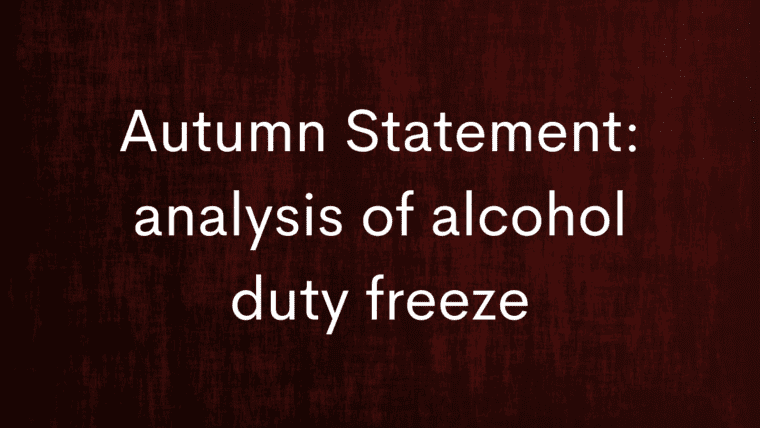
In his Autumn Statement on Wednesday 22 November, Chancellor Jeremy Hunt froze all alcohol duties until August 2024. He stated that: “for many people, going to the pub has become more expensive” and that having listened closely to various MPs, a Councillor in his constituency, and The Sun newspaper, “I have decided to freeze all alcohol duty until 1 August next year; that means no increase in duty on beer, cider, wine or spirits.”
In the accompanying publication (p.95) it states that:
“The government will freeze alcohol duties until 1 August 2024 and delay its annual uprating decision to Spring Budget 2024 to give businesses time to adapt to the duty system introduced on 1 August 2023.”
What does this mean?
To understand what it means, first we need to understand what is supposed to happen and what has actually happened. Spoiler: it’s very inconsistent and confusing, as our recent report on how duty announcements are communicated has pointed out.
What is supposed to happen? In theory, the Treasury and Office for Budget Responsibility have a default assumption that all alcohol duty rates will go up with inflation year-on-year from 01 February, so that alcohol duty does not lose value in real terms.
What has actually happened? Alcohol duties have been cut or frozen (a real-terms cut) most years over the past decade, either at the Spring Budget or the Autumn Statement (the latter only started in 2017 – before then there was usually only one fiscal event each year). The past year has been slightly more confusing, as we’ve had:
- Autumn 2022: a freeze, then a U-turn, then a U-turn on the U-turn…
- Spring 2023: uprating by RPI inflation, but delayed until August 2023 when the new duty structures came in.
As duty was already uprated in August this year, it was unlikely that it would be uprated again in the Autumn Statement. The alcohol industry and hospitality groups made the typical claims for cuts and freezes. By inundating the media with arguments about how damaging uprating would supposedly be to the (multi-billion pound) alcohol industry and drinkers, industry trade groups can now go back to their members and the media and say they were successful in lobbying the government to freeze duty. It also contributes to a saturation of media articles, framing alcohol duty changes as solely relating to the impact on industry – especially pubs – and impact on the customer, as opposed to a public health concern. Compare this to how tobacco duty is discussed in the media, which almost solely relates to uprating duty as a public health measure. And there are no industry voices bemoaning the impact on the tobacco industry or smokers.
However, cutting and freezing alcohol duty across the board is not good for hospitality, as we discussed in a previous blog. This is because it disproportionately helps supermarkets keep prices low: the biggest threat to alcohol sales in hospitality venues is cheap, supermarket alcohol. The only time over the past 20 years when alcohol prices in hospitality and supermarkets was not widening was during the ‘duty escalator’, when duty was being increased by 2% above inflation. For all the appeal of trade groups and government saying that alcohol duty freezes help the ‘Great British Pub’, they actually contribute to harming it. Over the past decade alcohol duty has been mostly cut or frozen and pubs have continued to close.
Rising affordability of alcohol, 1987-2020

At what cost?
The Treasury calculates that its decision to freeze duty will cost it over £300 million. Meaning either that money has to be raised in tax elsewhere or public services lose that spending. This is why many within the public health community argue that duty cuts and freezes cost the taxpayer. And there is little financial benefit of such freezes to moderate drinkers. The benefit goes to multinational producers; those who consistently lobby for cuts and freezes.
What’s next?
The odd timing of the duty uprating in August has created a bit of confusion and raises a number of questions. Firstly, will duty decisions now be made in August, so that they are annual? This could be an interesting change, as it could reduce the media focus on it by moving it away from fiscal events.
More specifically, will there be an uprating announced in the Spring Budget 2024? In theory, there should be, however that seems unlikely, especially as this will likely be in the run up to the General Election. The government will want to portray itself as supporting industry, and all previous duty cuts and freezes have been framed as ‘supporting industry and business, especially the ‘Great British Pub’. Public health groups will be working hard to try and rebalance this debate and ensure the impact of duty cuts and freezes on our NHS and public services is not forgotten.
For more on this topic, including why cuts and freezes increase alcohol deaths, read our Spring Budget Analysis here.
Written by Jem Roberts, Communications Manager, Institute of Alcohol Studies.
All IAS Blogposts are published with the permission of the author. The views expressed are solely the author’s own and do not necessarily represent the views of the Institute of Alcohol Studies.
